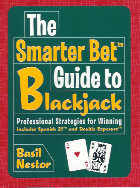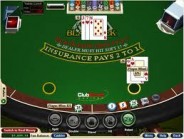Blackjack Insurance strategy

 Smarter Bet Guide to Blackjack
Smarter Bet Guide to Blackjack
by Basil Nestor
Strategy is the key to success at the blackjack table; that's a mathematical fact, and you can count on these expert, easy-to-learn tactics to make you a victor. Here's the deal: everything begins with the basic rules, and they're laid out on these pages with smart little “factoid” tips. Go through blackjack economics, which explain why cards fall the way they do, and what makes a good (and a sucker) bet. Easy-to-follow tables suggest strategies for splitting pairs and soft hands and provide dozens of other statistics and card probabilities.
Find Single Deck Blackjack Online!
Intercasino has a single-deck blackjack table with very favorable rules, even though the cards are reshuffled after each hand. The difference between it and the regular blackjack game is that the dealer must hit a soft 17. The resulting house edge for this game is a very low 0.07% and is the recommended game to play.
The hazy area where negative expectation blends into positive expectation is called the “fuzz.” People who play blackjack without using basic strategy are nowhere near the fuzz.Basil Nestor is the author of the new Playboy Complete Guide to Casino Gambling. This wonderful book teaches players how to avoid sucker bets and win more when playing gambling games. He is also the author of The Smarter Bet Guide series for video poker, slots, craps, and many other books about gambling. Basil's website is They usually lose somewhere between 2 percent and 5 percent of all the money that they bet over time (depending on how much a player deviates from optimal choices). And this is cumulative, so it’s at least 2 percent plus 2 percent and so on until all of the player’s money is gone.In contrast, basic strategy lowers the house edge usually to somewhere less than 0.5 percent (well into the fuzz), and it occasionally pushes the edge into the positive range depending on the game’s exact combination of rules. But you have to use the entire strategy to get the full benefit. Here are some examples.Third-base players are sometimes harassed by other players for not correctly playing basic strategy. Drawing a 10 that would otherwise bust the dealer is particularly unpopular. If you don’t want the attention, don’t play third base.
 The Importance of Doubling and Splitting
The Importance of Doubling and Splitting
Remember, a positive-expectation game absolutely requires doubling and splitting in all appropriate situations.
Hitting Stiff Hands
Busting with a stiff hand is a drag, especially when the dealer’s hand turns out to be stiff, too. But your overall chance of losing is much greater when you stand on stiffs against 7 through ace.
This is a situation of losing less rather than winning more because, frankly, stiff hands against strong cards are consistent money-losers. So you’re simply trying to squeeze the most out of a bad situation.
Conversely, the situation isn’t so bad that you should surrender a hand unless basic strategy actually indicates a surrender. Consider this: surrender costs two full bets after four hands (one-half bet per surrender). A stiff hand would have to lose three times out of four to equal that cost (1 win – 3 losses = -2). Most stiff hands have a greater value than that.
So you should surrender only hands that total 15 and 16, and only in specific circumstances. A hand of 15 should be surrendered against 10, and 16 should be surrendered against 9, 10, or ace.
The Insurance Gamble
Insurance is a bad bet. The probability of finding a 10 under the dealer’s ace is less than 1 in 3 (about 31 percent), but insurance pays only 2 to 1. It works out to a house edge of about 7 percent. That’s worse than roulette and about the same as slot machines.Nevertheless, some people insure their naturals when the dealer is showing an ace because it guarantees a 1:1 payout. Insurance in this situation is still a bad bet, but here how the wager works:
- If the player insures and the dealer has a natural, the two naturals push and insurance wins. 0 + 1 = 1
- If the dealer doesn’t have a natural, the player’s natural wins and the insurance loses. 1.5 – 0.5 = 1
Kam Heskin (born Kam Erika Heskin on May 8, 1973) is an American actress best known for her roles as the second Caitlin Richards Deschanel on NBC's soap opera Sunset Beach (1998–1999) and as her role as Paige Morgan in the The Prince and Me sequels.
Heskin was born in Grand Forks, North Dakota. She attended Grand Junction High School before she...

